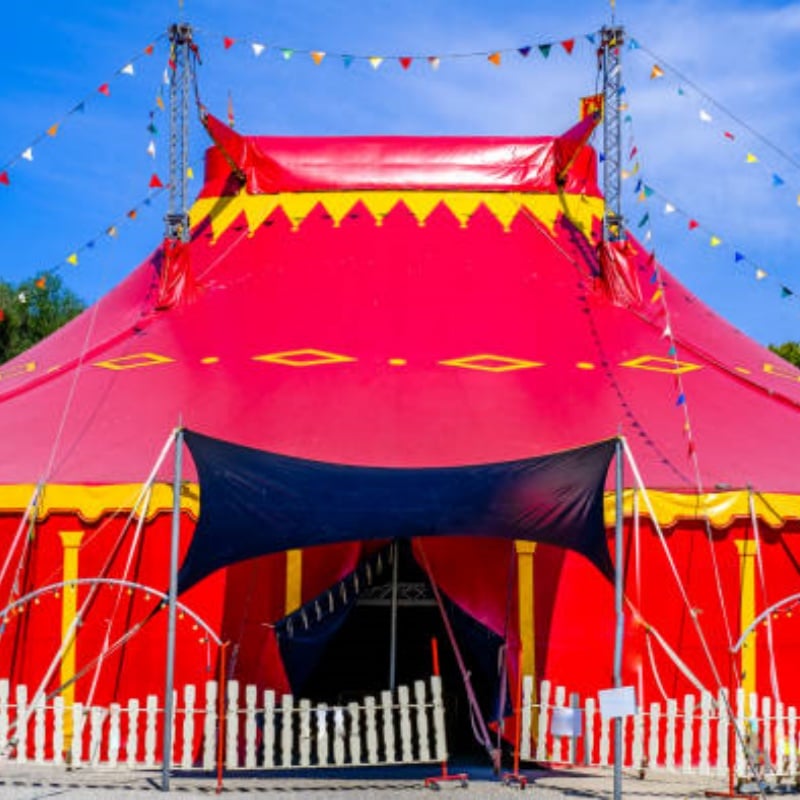The Basics of Circus Tents and Their Structure
Circus tents, also known as big tops, are designed with a specific structure that allows for optimal use of space and ventilation. The tent consists of a large center pole and several smaller poles that support the canvas roof. The canvas is typically made of a heavy-duty material that is resistant to water and wind. However, this material does not do much to insulate the tent, which raises the question:
Is it cold inside a circus tent??
The answer to this question is not a simple yes or no. The temperature inside a circus tent varies based on several factors, including the time of day, the weather conditions, and the number of people inside the tent. In general, circus tents do not have insulation, and the materials used to construct them do not retain heat well. This means that on cold or windy days, the temperature inside the tent can be quite chilly. However, on warm days, the open structure of the tent allows for plenty of air circulation, keeping the space cool and comfortable.
The Impact of Weather Conditions on Tent Temperature
The temperature inside a circus tent is highly influenced by the weather conditions outside. On hot days, the tent may feel warm and stuffy, while on cold days, it may feel positively frigid. Rain, wind, and snow can also impact the temperature inside the tent, making it feel damp and chilly. Circus performers must learn to adapt to these conditions and dress accordingly, even when performing high-flying acrobatic acts.
The Importance of Dressing Warmly in a Circus Tent
Because circus tents are not insulated, it is important to dress warmly when attending a circus performance, particularly during colder months. Layering clothes is key, as it allows you to adjust your body temperature as needed throughout the performance. Hats, scarves, and gloves are also recommended, as they help to keep extremities warm. It's always better to come prepared with warm clothing than to risk being uncomfortable and distracted during the show.
How Performers Deal with Cold Temperatures
Circus performers are true professionals, and they are well-versed in dealing with a wide range of environmental conditions. In cold temperatures, performers must take extra precautions to ensure their safety and the quality of their performance. For example, aerial artists may opt to wear extra layers of clothing or use hand warmers to keep their fingers flexible. Jugglers and other performers may choose to wear gloves or mittens to protect their hands from the cold.
The Benefits and Drawbacks of a Non-insulated Tent
While it may seem inconvenient to perform or attend a circus show in a non-insulated tent, there are actually some benefits to this setup. For one, the open structure of the tent allows for plenty of air circulation, which can be refreshing on a hot day. It also allows for natural light to come into the tent, which can create a pleasant atmosphere. However, on colder days, the lack of insulation can make the tent uncomfortably chilly, which is why it's important to dress appropriately and come prepared.
The Future of Circus Tents
Circus tents have been around for centuries, and they continue to be a crucial part of the circus experience. However, as technology advances and climate change becomes increasingly urgent, it's worth considering whether it's time for circus tents to evolve as well. Some circus companies are exploring the use of more sustainable and energy-efficient structures, such as geodesic domes or yurts, which could provide more insulation and climate control. It will be interesting to see how these innovations impact the future of circus performances.
The Importance of Being Prepared for Circus Performances
Whether you're attending a circus performance or participating as a performer, it is crucial to be prepared for the environmental conditions you may encounter. This includes dressing appropriately, bringing necessary gear (such as hand warmers or sunscreen), and staying hydrated throughout the show. By being prepared and adaptable, you can focus on enjoying the spectacle of the circus without being distracted or uncomfortable.
Conclusion
The question of whether it's cold inside a circus tent is a complex one, with many factors impacting the answer. While circus tents are not insulated and can feel chilly on cold days, they also provide a unique atmosphere and sense of openness that is hard to replicate in an indoor venue. By understanding the nature of circus tents and being prepared for the conditions you may encounter, you can fully enjoy the magic and wonder of the circus.

